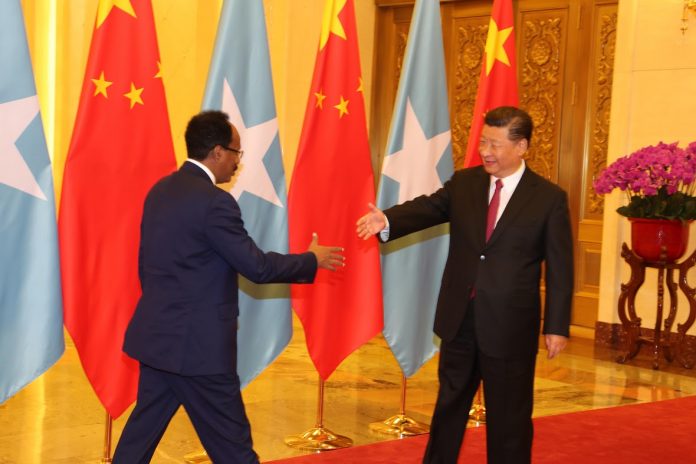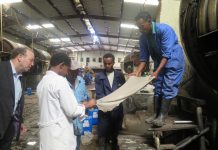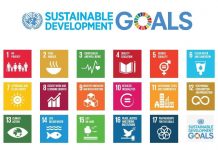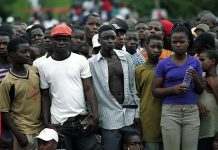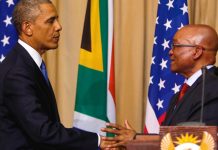I am sick and tired of being sick and tired of complaints that China is taking advantage of Africans even as it provides money to assist in the development of the continent.
For more than half a century I have heard my African brothers chant the money chant: “Gimme money! Bring me money! More money!” And the Europeans gave, then the Americans gave, and now the Chinese are giving the money. So I will essentially repeat what I said to a colleague in the Jamaican government in the late 1970s, when I ventured into that country’s democratic socialist experiment as an “entrepreneurial hired gun” for a state corporation. Back then I said, “The British raped us; the Americans f,,,,d us; so go make love to the Arabs. What do you have to lose?”
Today, it’s Africa, not Jamaica, and the Chinese are the ones to make love to. What do you have to lose?
Recently I have been spending a considerable amount of time on the road stretching from Mombasa, Kenya, to Kampala, Uganda, experiencing the nightmare of tractor trailers moving containers and petroleum tanks on roads built decades ago for European cars—long before the era of the SUV. I am told there exists a semblance of the earlier rail system, but the Chinese money has not reached there yet, and there is no evidence that much of the European and American money of the past few decades was spent on rail transportation.
I recall Chinese involvement in the Tanzania-to-Zambia railway link. For me, that was an early example of African options. When Zambia needed to move its copper to buyers overseas, one option was to purchase jumbo jets to fly the copper to European and American markets. The sale of those cargo jumbo jets—at the time a breakthrough for Boeing—would have provided considerable economic benefit to Boeing and the investment banking community, but, as I argued to my Zambian associates at the time, very little benefit to the millions living between Dar es Salaam and Livingston.
With its latest pledge of $60 billion in aid and loans, announced by Chinese President Xi Jinping during his keynote speech at the Forum on China-Africa Cooperation in Beijing in September, China has now invested $124 billion in Africa since 2000. I have enjoyed the roads they have built, and I am looking forward to faster and safer transport. Indeed, the roads are so enticing that in my wild musings I see myself buying a Honda 500cc motorbike just to enjoy them.
But I am a railway buff and it disgusts me to see Africans destroying the Chinese-built roads in using them to move cargo that can be moved more efficiently and at less cost by rail. I would bet that the amount of money “siphoned off” by corrupt or ignorant locals over the past 50 years from European and American aid, trade, loans, and investments could have maintained and even improved the Mombasa-Kampala rail system.
A good rail system would also eliminate the social and economic border nightmare of current inter-regional trade and create a customs system more in line with a modern 21st Century trading environment that is ready for the Continental Free Trade regime.
I have no illusions about the $124 billion China has provided to Africa since 2000. By no means is this amount a gift. Rather, it is a combination of loans, grants and guarantees that amounts to approximately $2.3 billion per country. Today, the ten African countries with the largest debt to China owe that country some $80 billion combined. Consider, meanwhile, that remittances to Sub-Saharan Africa by Africans residing abroad were approximately $38 billion in 2017 alone, as The World Bank reported.
Surely it is time for Africans to start rethinking our priorities and focus on who really is contributing to Africa’s future.
Perhaps that rethink already is under way as Ghanaian President Nana Akufo-Addo chooses to commemorate the sacrifice of Africans in the slave trade by launching “The Year of Return, Ghana 2019” to coincide with the 400th year since, reportedly, the first slave ship landed in Virginia. In his remarks at the September launch in New York City, President Akufo-Addo noted that “together on both sides of the Atlantic we will work together to make sure that never again will we allow a handful of people with superior technology to walk into Africa, seize our people, and sell them into slavery.”
Africans must learn from the Chinese how, in these past 50 years, they lifted millions of their people out of poverty, achieving world leadership in technology and economic power second only to that of the United States. It took more than money. It took vision, commitment, sacrifice and unity of purpose for such an achievement in a country with far fewer natural resources than Africa’s although with equal human resources. China, like India, benefited immensely from the contribution of their diaspora nationals when the call for return was made.
It is not surprising that Washington’s current tariff pressure on China is intended to change China’s trade, technology transfer and high-tech industrial subsidy policies. These are critical policy areas for the sustainable, long-term development of any emerging economy, especially for an Africa that must meet the demands of a 2 billion population that includes a fast-growing middle class and widely unemployed youth.
One can be optimistic, given the wealth of Africa’s natural and human resources, and the opportunity to study, tailor and apply lessons from China’s achievement to the creation of a unified, industrial and economically advanced Africa. Moreover, young Africans face a future drastically different from the post-colonial, post-Cold War world dominated by Western European and American systems grounded in economic and military might and the control of global resources that primarily benefit Western Europe and America. Today’s high-tech, globalized world has somewhat levelled the playing field for those who would dare challenge that status quo.
Modern China, from Mao Tse Tung to Xi, has been consistent and clear in its intent to be a global power—in what is in its best economic, political and cultural interests. So, too, have Europe and the United States. That is a lesson Africans must learn and be prepared to defend. Unfortunately, too many Africans in positions of influence and power remain yoked to the dying status quo and captivated by “forked tongues” when engaging global partners. One African said it best recently: “We are being led by persons with analog thinking in a digitized world.” For a region with a dominant young population, that is a serious problem.
While China embraced the visions of Confucius and Mao Tse Tung in formulating a long-term strategy for their country’s economic success, Africa largely rejected the visionary, long-term empowering strategies of early-20th Century Pan Africanist Marcus Mosiah Garvey, especially his “One God, One aim, One destiny!” and “Africa for Africans at home and abroad” appeals to continental and diaspora Africans. Note that when Africans and their Caribbean brothers and sisters agreed that it was time to end the monster of colonialism, they achieved that end in less than fifty years with little more than will, collaboration, and commitment.
As I grapple with solutions proposed by Pan African and Africanist ideologues to address our present state of affairs, I find the Pan African to be globally oriented, while many Africanists cannot see beyond their personal desires and interests. And the latter often translates only into the acquisition of material trimmings and personal wealth.
So, when Africans complain about China’s investing money and labor in exchange for the natural resources they have made clear they want in return, I suggest they reflect on the legacy of Europeans, such as King Leopold and Cecil Rhodes, for Africans who did not have the luxury of negotiating any kind of deal. A critical analysis should include the impact of the money and labor of highly touted aid programs on Africa’s development in the past few decades.
Responding to complaints about China’s Africa dealings, President Xi noted that China is not interested in “vanity” projects. I understand this when I see Chinese agricultural experts equipped with hoes in the maize field alongside African farmers and obtaining a 100-percent increase in yield. But I wonder if President Xi would consider “vanity’ the U.S. military base in Djibouti, possibly the largest overseas military base on the continent, positioned, I assume, to ensure minimum or no disruption of the lifeblood of U.S. and EU industry, gulf oil. China has decided that it, too, will join western countries in making Djibouti the military capital of Africa by locating its first overseas military base there.
It is the responsibility of young African business and political leaders to determine the ultimate value to Africans of these military investments. Benefit to Africans must be the priority of Africans. There is nothing wrong with this. For, if you do not know where you are going, any road will take you there. Similarly, if you do not know what you want, you will settle for whatever you get. The young African entrepreneurs I meet give me hope that they have the ability and savvy to manage the Chinese.
It has been a long, tedious path for the countries that participated in the 1955 Bandung conference in Indonesia that sought to establish economic and cultural collaboration between Asians and Africans to oppose colonialism and neocolonialism. Of the 21 countries representing 54 percent of the world population then, continental Africa was represented by Egypt, Ghana, Ethiopia, Liberia, Libya and Sudan. From the diaspora there were Adam Clayton Powell and Richard Wright, both eminently qualified to reflect our political and cultural interests. China was at Bandung in 1955, as it was at the 50th anniversary conference in 2005 that launched the Asian African Strategic Partnership to achieve political, economic and cultural cooperation between the two continents.
I may be sick and tired of the burden of the righteous and relentless struggle that we Africans and people of African descent have been waging for so long, but “I am ready for the revolution” that I sense from the digital generation. As an elder I offer this:
You, digital generationers, are the product of the change that resulted from the actions of those brilliant, courageous individuals who met in 1955. You cannot and should not attempt to or be coerced to go back to the way it was. We live and die by the choices we make, so be deliberate in your decisions. This is your time. If you choose to stand on my shoulder, just be damn sure we are heading in the same direction—the social, economic and spiritual path mapped by Marcus Garvey, His Imperial Majesty Haile Selassie and Kwame Nkrumah.
Fritz-Earle Mc Lymont is a New York City-based international trade and business development strategist currently engaged in agriculture, mining and energy in Africa, the Caribbean and the U.S. He can be contacted at mclymont@globaldrinc.com.


